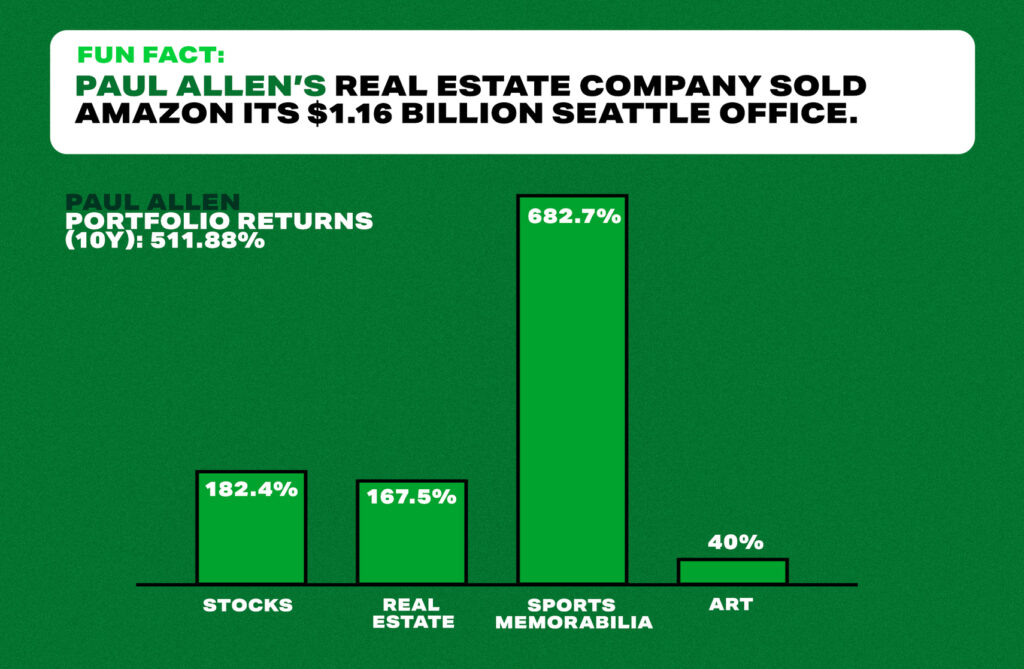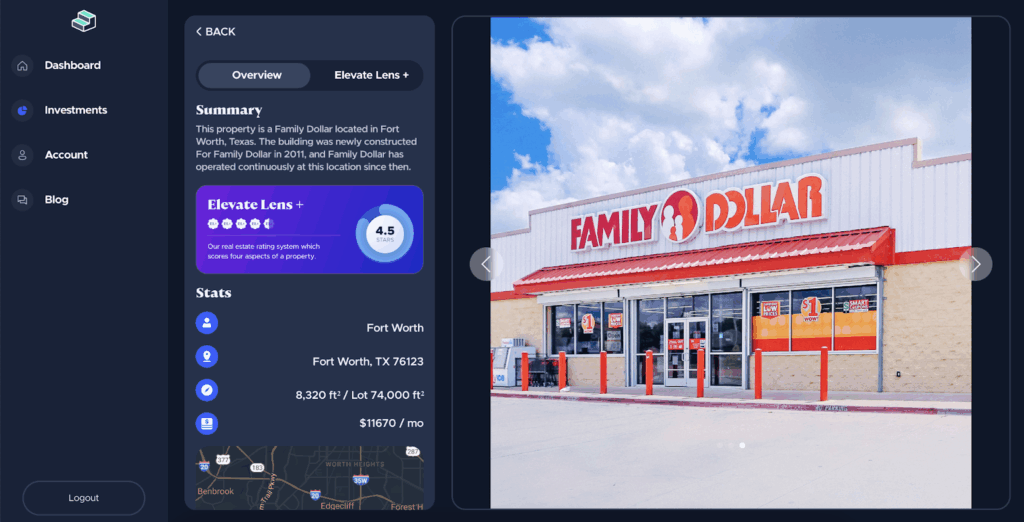Rich Dudes│How Paul Allen Built His $20B Net Worth Without Microsoft
Paul Allen was worth $20.3 billion at the time of his death in 2018. Here’s what his sports teams, yachts, art, stocks, real estate & other assets are worth.

- Paul Allen co-founded Microsoft with Bill Gates but grew most of his $20 billion net worth with investments in sports teams, real estate, stocks, and fine art.
- Paul Allen’s Vulcan Real Estate sold Amazon its $1.16 billion Seattle office.
- Paul Allen has netted over 1,100% returns on his sports team deals.

The late Paul Gardner Allen, also known as the Idea Man, was a businessman, investor, sports team owner, and philanthropist worth an estimated $20.3 billion.
While Paul Allen was best known for co-founding the Microsoft Corporation with Bill Gates, he grew most of his $20 billion net worth with alternative investments—including sports teams like the Seattle Seahawks and the Portland Trail Blazers.
During his lifetime, Allen also donated over $2 billion towards philanthropic causes in science, education, wildlife conservation, and the arts.
Since a 1% stake in Microsoft today is equal to the value of Paul Allen’s entire $20.3 billion estate, it’s clear that Paul Allen sold a lot of his stock…
After he died in 2018 from non-Hodgkin lymphoma, the executor of Paul Allen’s will began selling all of his assets—including an art collection that recently fetched $1.6 billion at auction—and donating the proceeds to charity.
We dived into Paul Allen’s $20.3 billion investment portfolio of sports teams, real estate, startups, fine art, and more. So read on if you want to learn how to invest like this billionaire.
Paul Allen net worth at a glance
| Net worth | $20.3 billion |
| Ranking | 44th-wealthiest person in the world (Forbes, 2018) |
| Born | January 21, 1953. Aged 65 at the time of his death on October 15, 2018 |
| Nationality | American born in Seattle, Washington, United States |
| Occupations | Entrepreneur, investor, philanthropist, sports team owner |
| Sources of wealth | Microsoft, Vulcan Inc, Seattle Seahawks, Portland Trail Blazers, Seattle Sounders FC |
| Asset classes | Stocks, Startups, Art, Real Estate, Sports Memorabilia |
The beginning of Paul Allen net worth: Microsoft and Bill Gates
When you think of Microsoft, Bill Gates mostly comes to mind. But he didn’t build the $1.8 trillion technology giant on his own—his childhood friend and co-founder Paul Allen was by his side for the early years of Microsoft.

Source: forbes.com
In 1975, Allen convinced Gates to drop out of college with him and create Microsoft. They ran it together, with Gates taking the lead—and the larger stake—until 1983, when health problems and differences with his playmate-turned-partner caused Allen to resign from the company.
While they were both owners, Gates convinced Allen that his contribution to the company was smaller and that he should take a 36% cut to Gates’ 64%.
39 years later, Paul Allen’s net worth represents less than 20% of Bill Gates’s $104 billion fortune—though it’s nothing to sneeze at. Despite co-founding Microsoft, he held onto very little of his stock in the company.
In 1986, when Microsoft went public, Allen had 25% of the company. By 2000, his stake had dipped below 5%—presumably worth much less than $30.3 billion. It’s unclear how much he owned after that because the company no longer needed to report his holdings.
How much does Paul Allen make a year?
Microsoft’s successful IPO in 1986 gave the software maker a market capitalization of $777 million. Paul Allen’s 25% stake worth $194 million means he made the equivalent of $17.63 million per year and $48,300 per day since Microsoft was founded in 1975.
How did Paul Gardner Allen invest his money?
Paul Allen may have been a deca-billionaire, but he also missed out on some big-time investment gains.
Since a 1% stake in Microsoft is equal to the value of Paul Allen’s estate worth $20.3 billion today, it’s clear that Paul Allen sold a lot of his stock—losing $630 billion (97%) in potential gains. That’s over three times Elon Musk’s 2022 net worth.

Much of Paul Allen’s portfolio isn’t publicly known, but we have some clues and recent information about what Allen bought and sold over the years.
1. Paul Allen yacht collection & real estate

Source: Los Angeles Times
| Biggest Win |
| Amazon HQ: +$1.6B |
The crown jewel of Paul Allen’s net worth was Vulcan Real Estate. The development and property management company reshaped downtown Seattle with $4.3 billion worth of real estate there. Vulcan Real Estate drew Amazon to the area, selling them a $1.16 billion office.
Allen’s personal real estate holdings spanned the country, from West Coast mansions to apartments in New York City. Since 2021, the trust has sold $233 million worth of Allen’s properties, including $101 million in NYC apartments and $35 million for his Silicon Valley mansion.
That same year, Paul Allen’s 414-foot megayacht Octopus was sold for around $278 million. His 303-foot superyacht Tatoosh followed soon after for $90M.

Source: Business Insider
2. Paul Allen art collection
| Biggest Win |
| Les Poseuses, Ensemble (Petite version): +$149M |
Allen purchased many valuable artworks to build one of the world’s most expensive collections—which was sold off in November 2022 for a record-setting $1.6 billion.
The sale, held at Christie’s Auction House, was the biggest in auction history. The Paul G. Allen Collection consisted of 115 pieces of artwork by artists like Cezanne, Gauguin, Van Gogh as well as sculptures and ceramics by Pablo Picasso.
Of the 115 pieces in the collection, five sold for over $100 million. This includes:
- Paul Cezanne’s La Montagne Sainte-Victoire: $137.79 million
- Vincent Van Gogh’s Verger avec cyprès: $117.18 million
- Paul Gauguin’s Maternité II: $105.73 million
- Gustav Klimt’s Birch Forest: $104.58 million
But the most expensive piece of fine art in the collection was a painting by Georges Seraut, a French post-impressionist artist known for his pointillism work. Les Poseuses, Ensemble (Petite version) sold for $149 million, nearly five times the previous high for Seraut’s work.

Source: christies.com
3. Paul Allen space company & other investments
| Biggest Loss |
| Charter Communications: -$8B |
Allen was passionate about science and science fiction. He founded the Allen Institute in 2003 with initial funding of $100 million and an additional $300 million in 2012.
Besides funding grants and scientific research through the Allen Institute, he began multiple aerospace ventures in 2004. He started at least three different companies trying to make space travel affordable and put serious capital into attempting to discover extraterrestrial life—like $30 million to build the Allen Telescope Array in 2005.
Paul Allen’s early investments after leaving Microsoft focused more on companies and startups that were pursuing his idea of a “wired world” where everyone’s on the internet. This included companies like American On-Line (AOL), cable and internet providers, and media companies.
Despite his initial enthusiasm, Paul Allen sold his AOL stock early after being ridiculed by Bill Gates for believing AOL could beat Microsoft in bringing the internet to the masses. His AOL stake would have been worth $40 billion had he sold it at its peak. Instead, he pocketed $75 million profit in 1994.
At one point, the Idea Man owned Charter Communications, the 7th largest cable company in the world valued at $25 billion. However, Allen ultimately lost over $7 billion on his investment after the company’s bankruptcy in 2009.
4. Paul Allen sports teams: Seahawks and Trail Blazers

Source: Seattle Sports
| Biggest Win |
| Seattle Seahawks: +$4.1 billion |
Among Allen’s more offbeat investments are the two professional sports teams he purchased. In 1988, Allen bought the Portland Trail Blazers for $70 million—or $176 million in 2022 dollars. Then nine years later, in 1997, he snagged the Seattle Seahawks for $194 million—or $360 million today.
Today those teams are worth $2.1 billion and $4.5 billion, respectively, each netting over 1,100% returns before factoring in any income they produced. He was also part-owner of the Seattle Sounders FC, a Major League Soccer team valued at $705 million in 2021.
Should you invest like Paul Allen?
Based on public information about the sales of his assets and his initial investments in some of them, we can make some assumptions about how Paul Allen’s net worth breaks down.

If we group those assets into investment classes, Allen’s portfolio probably looked something like this:

Had you put $10,000 into a portfolio like this for the past 10 years, you would have $61,188 in 2022. That’s a 511.88% increase thanks to a 1,300% gain in sports memorabilia.
A standard 60/40 portfolio—with 60% of your money in stocks and 40% in bonds—would have yielded 110.89% returns in the same time period. Your $10,000 initial investment would only be worth $21,089 today.
A more diversified portfolio that’s still fairly traditional might look like this:

This investment portfolio would turn your initial $10,000 into $20,725—a 107.25% increase in 10 years. That’s still over $40,000 less than you would have made investing in a Paul Allen-inspired portfolio.
Paul Allen might have kicked himself for selling hundreds of billions of dollars worth of Microsoft stock, but his alternative asset investments still helped preserve his status as a multi-billionaire and one of the wealthiest people in the world in 2018.

How to invest like Paul Allen?
Even if you don’t have megayacht money or a tech genius bestie to launch a business with, you can still learn some lessons from Paul Allen’s investments.

Source: GeekWire
1. Diversify your portfolio
Investing in various assets will help you hold onto some money when things go south (or when someone peer pressures you into selling off potential billions). Gaining exposure to several uncorrelated asset classes is a time-honored diversification strategy—having some exposure to sports cards could give you downside protection since they’re a proven store of value.
For instance, you if you invested in the S&P 500 a year ago, you would be down nearly 16%, but if you bough and held a Stephen Curry rookie card at the same time, you would be up over 21% on your investment. There are only 61 PSA-10 Steph Curry rooky cards and they go for upwards of $50K, but you can buy shares in one for less than $20 on Public.

Source: Public
Public is not just for sports cards, either. They let you invest in stocks, ETFs, cryptos, and other collectibles, like game-worn Air Jordan 1’s signed by MJ himself. If you want to build out a diversified portfolio accross both alternatives and traditional assets, Public is the best place to start.
2. Invest in your passions
Whether it’s music, art, or space exploration, you can invest your money in alternative assets that you love. While owning tangible assets like artwork and sports memorabilia is a good strategy, another route you can take is investing in companies you’re passionate about.
Video gaming is one of the most valuable pastimes—an industry worth over $50 billion in the U.S. alone, but unless you’re buying retro video games and holding them for years, you’re unlikely to make a return on your PS3 copy of GTA V. A better way to invest in video games is by buying equity the companies that make them.

But what if your favorite video game publisher hasn’t gone public? Well, fear not, because accredited investors can now gain exposure to the creators of Fortnite through Dizraptor. Though you can’t invest in Epic Games through the stock market, Dizraptor lets you buy shares in the company at their pre-IPO price of $830. Now’s your chance to get in on the ground floor of a $28.2 billion company.
3. Own equity in recession-proof businesses
Holding productive assets in your portfolio helps guarantee that cash will keep flowing into your bank account. While stocks and crypto go up and down with the economy, certain businesses have the fortitude to withstand tough markets. Just think about how many people frequent gas stations, fast food restaurants, and dollar stores regardless of how the market is doing.
While not everyone can own a Chick-fil-A, owning a piece of commercial real estate is the next best thing. And that doesn’t mean owning it outright. Nowadays, anyone with $100 to spare can invest in income-generating commercial real estate. Platforms like Elevate Money let you buy shares in a durable business—like a Family Dollar in Fort Worth, TX—by offering fractional ownership in the land underneath it.

Commerical real estate is the best source of passive income because it’s stable—Family Dollar is unlikely to go anywhere considering their lease term is 5 years. If you’re not a landlord with deep pockets and the patience to find and manage tenants, use Elevate Money to invest in commercial real estate and earn passive income.
Jody Allen net worth
Paul Allen never married or had children, and his estate was entrusted to his sister Jody Allen after his death. Jody Allen’s net worth is estimated at $20.3 billion. She was responsible for overseeing the execution of Paul Allen’s will. She also took control of the properties he owned, including the Seattle Seahawks NFL team, and continues to run Vulcan, Inc.
Where did Paul Allen’s money go?
After leaving Microsoft in 1983, Allen began investing in companies that would support his vision of a “wired world” where everyone was online. He made $25 billion investments in cable and internet providers as well as traditional and online media. He even purchased 80% of TicketMaster in 1993 but sold half his stake to The Home Shopping Network for HSN equity. In 2015, Allen founded Vulcan Aerospace.
Allen was a man of the arts, amassing an art collection that sold for $1.6 billion after his death. His other expensive hobbies were buying sports teams—he owned or had a stake in three professional sports teams—yachting, researching time travel, and exploring space.
Allen was also a philanthropist who spent the last decades of his life getting involved with various causes. His donations to these causes came to over $2 billion by the time of his 2018 death.
Why is Bill Gates richer than Paul Allen?
Microsoft was not an equal partnership. The equity was doled out in a 64/36 split that favored Gates. Paul Allen was only involved in the company from 1975 to 1983, at which time he began selling shares to fund his many other ventures that weren’t as successful as Microsoft.
He bought a large stake in AOL in the early 1990s but sold it all before it became big. He also lost around $7 billion by investing in cable companies.
Paul Gardner Allen famously led a lavish lifestyle. The billions he spent on passion projects, like music museums, ate into Paul Allen net worth.
